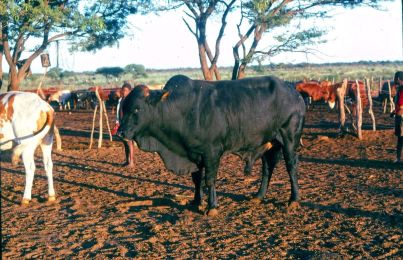© 2018 Dr Margaret Sheppard
Childhood
Babies are not usually completely weaned until they are 2-
Babies receive a great deal of maternal attention. They are fed on demand, are never left to cry but always picked up to be comforted, they sleep with their mothers at night. They are always with their mothers, nestled in a blanket on her back when she is on errands, visiting or travelling. The mothers take a tremendous pride in their babies, they are often immaculately dressed in baby sets (complete with hat, bootees or shoes, and mittens), or many mothers still dress them in the beautiful traditional bead disega (for boys) or dimakgabe (for girls) which are often underneath their Western style baby clothes. It should also be mentioned that when a mother is eating herself, she will never hold her baby as well, this is a taboo.
As they grow older and learn to walk and talk, children begin to play with, and they are increasingly minded by, older children. These "nannies" spoil them greatly, but at the same time they begin to learn from the example of the older children, their future role in life. It is not uncommon to see young (2 or 3 year old) children with small tins "helping" the older ones to fetch water at the village water taps.
As they grow older, small boys start to spend-
During the agricultural season the children go to the Lands. If their mothers are in employment they will stay there with grandmothers and learn the work of the Lands. Boys, as they grow older will go to the Cattle posts and learn herding etc., with the older boys who stay there.



Grandmothers are often the chief child carers of pre-
Feeding the toddler
“Helping” the grandmother at the Lands -

Helping the grandfather with weeding at the Lands

“Ox wagon” made of vertebrae -

Young girls washing dishes -

Grandchildren at the Lands preparing mealie cobs

Grandmothers and mothers taking it in turns to care for young children whilst mother winnowing sorghum at lands on threshing floor.
Learning the work of the Cattlepost
Learning work of the Lands





Herding and kraaling the goats

Small boys observing the cattle kraal
Young herdsman letting out the cattle in the morning to drink and graze


Learning how to check the health of cattle

“Manly” jokes!
Nowadays an increasing number of children go to school. It is usual for children to start at school in the first Standard when they are between 6 and 8 years old. There~are seven Standards of primary education and, although a certain number drop out this is probably not due to lack of school fees. In 1980 school fees for primary schools were abolished, but before then they had only been P3 per annum. Probably more common reasons for drop-
At the end of Standard 7 there is a national examination which also functions as an entrance exam to the secondary schools and other forms of post primary training available, and for employment. Although this Standard 7 exam is supposed to be a test of ability families believe in doctoring their children to bring about success. If a child is lazy, disobedient or uncooperative at school this is frequently attributed to sorcery. That is the child is believed to have been bewitched by other people who are jealous. It should perhaps be noted that an educated child can be a great economic asset to a family as it is the custom for a child to work for its parents, to whom the earnings belong. Wages in Botswana are structured very heavily according to educational level attained and experience. Therefore children who are successful in the school system can easily attract the jealousy of neighbours and relatives and traditional parents would therefore protect their children from this.
Sickness in a child can be a result of, or symptom that the family is bewitched. (See section on Sorcery for more details) but some mention should be made of tlhowana and kokwane. These are fairly common childhood diseases. The word tlhowana means fontanelles. If the fontanelles of a baby do not join together properly and become sunken, this is believed to show that the baby is suffering from the disease called tlhowana, which can only be cured by specialists such as traditional doctors or certain female specialists. Western hospitals and Zionists are not believed to be able to cure this disease. If it remains uncured and the child survives to adulthood, the adult will suffer from eye trouble, poor sight, squints and headaches associated with the eyes. Uncured tlhowana can also lead to mental problems and even death.
Apart from the annual family doctoring as described by Schapera, and the doctoring to attain success at school, or healing from tlhowana and other diseases, children, especially young ones, are kept away from people with "hot blood", especially those who have been in close contact with death and have not yet been "washed".
It should be noted that as a child grows up it learns, by example and the teaching of the Tswana traditions, history, customs, rituals etc. It can be assumed that some of the traditions, especially traditional crafts that tended to be learnt over a lifetime of experience, are waning in modern times as children are separated from the traditional teachers (their parents, relatives, elders) in schools, to which an increasing number of children are obviously going. However even with secondary school children much of the traditional way of life is retained.
During the holidays, and often also at week-
However one custom that has certainly fallen into abeyance among the Bangwaketse, is that of initiation.
I

Helping to fetch wood